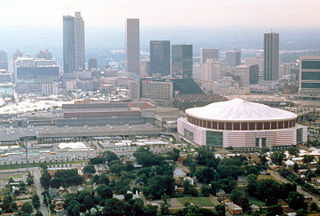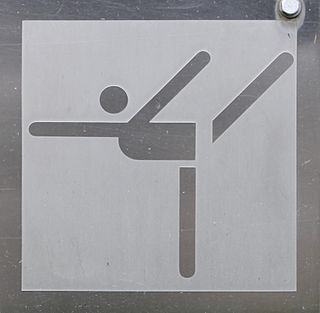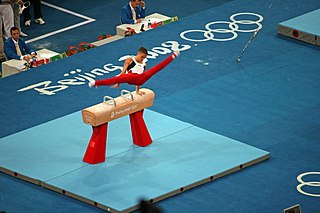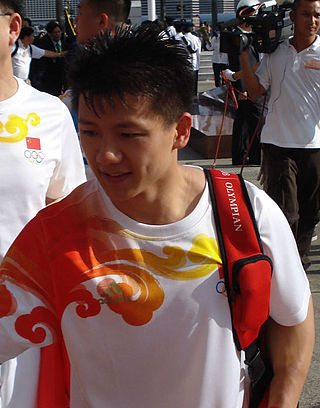This article includes a list of references, related reading, or external links, but its sources remain unclear because it lacks inline citations .(August 2021) |
The Gymnastics competitions in the 1983 Summer Universiade were held in Edmonton, Canada.
This article includes a list of references, related reading, or external links, but its sources remain unclear because it lacks inline citations .(August 2021) |
The Gymnastics competitions in the 1983 Summer Universiade were held in Edmonton, Canada.
The artistic gymnastics competition was carried out in three stages:
Each country was limited to three gymnasts in the all-around final and two gymnasts in each apparatus final.
| Event | Gold | Silver | Bronze |
|---|---|---|---|
| Individual all-around | |||
| Rings | |||
| Pommel horse | |||
| Vault | |||
| Floor exercise | |||
| Parallel bars | |||
| Bars | |||
| Team all-around |
| Event | Gold | Silver | Bronze |
|---|---|---|---|
| Individual all-around |
| ||
| Uneven Bars | |||
| Balance Beam | |||
| Vault | |||
| Floor Exercise | |||
| Team all-around |
| Rank | Nation | Gold | Silver | Bronze | Total |
|---|---|---|---|---|---|
| 1 | 9 | 6 | 2 | 17 | |
| 2 | 2 | 4 | 3 | 9 | |
| 3 | 2 | 2 | 1 | 5 | |
| 4 | 1 | 1 | 2 | 4 | |
| 5 | 0 | 1 | 4 | 5 | |
| 6 | 0 | 1 | 0 | 1 | |
| 7 | 0 | 0 | 1 | 1 | |
| Totals (7 entries) | 14 | 15 | 13 | 42 | |

At the 1996 Summer Olympics, two different gymnastics disciplines were contested: artistic gymnastics and rhythmic gymnastics. The artistic gymnastics events were held at the Georgia Dome from July 20–25 and July 28–29. The rhythmic gymnastics events were held at Stegeman Coliseum in nearby Athens, on the campus of the University of Georgia from August 1–4.

At the 1980 Summer Olympics, fourteen different artistic gymnastics events were contested, eight for men and six for women. All events were held at the Sports Palace of the Central Lenin Stadium in Moscow from July 20 through 25th. Several teams who had qualified to compete were absent as a result of the 1980 Summer Olympics boycott, including the United States, Canada, China, Japan, South Korea, and West Germany.
At the 1976 Summer Olympics, fourteen different artistic gymnastics events were contested, eight for men and six for women. All events were held at the Montreal Forum in Montreal from July 18 through 23.

At the 1972 Summer Olympics, fourteen different artistic gymnastics events were contested, eight for men and six for women. All events were held at the Sports Hall in Munich from 27 August through 1 September.
At the 1984 Summer Olympics, two different gymnastics disciplines were contested. In addition to the fourteen artistic gymnastics events contested, for the first time at the Olympics, a rhythmic gymnastics event was contested–the women's individual all-around. All of the gymnastics events were held at UCLA's Pauley Pavilion in Los Angeles from July 29 through August 11. Several countries who had qualified to compete were absent as a result of the 1984 Summer Olympics boycott, including the Soviet Union, Bulgaria, Cuba, Czechoslovakia, East Germany, Hungary, and North Korea.
At the 1988 Summer Olympics, two different gymnastics disciplines were contested: artistic gymnastics and rhythmic gymnastics. The artistic gymnastics events were held at the Olympic Gymnastics Hall in Seoul from September 18 through 25th. The rhythmic gymnastics events were held at the same venue from September 28 through 30th.
At the 1992 Summer Olympics, two different gymnastics were contested: artistic gymnastics and rhythmic gymnastics. The artistic gymnastics events were held at the Palau Sant Jordi from July 26 through August 2. The rhythmic gymnastics event were held at the Palau dels Esports de Barcelona from August 6 through 8th.

The men's vault competition at the 2008 Summer Olympics was held on August 9 and 18 at the Beijing National Indoor Stadium. The eight competitors with the highest scores in qualifying, among the gymnasts electing to make two vaults, proceeded to the men's vault finals. There, each gymnast performed two vaults; the scores from the final round determined final ranking. There were 16 competitors from 13 nations that made a second vault attempt. The event was won by Leszek Blanik of Poland, the nation's first victory in the men's vault. Blanik was the seventh man to win multiple medals in the event, adding to his 2000 bronze. France earned its first medal in the event with Thomas Bouhail's silver. Anton Golotsutskov of Russia took bronze, putting the nation back on the podium after a one-Games absence.

The men's pommel horse competition at the 2008 Summer Olympics was held on August 17 at the Beijing National Indoor Stadium. The eight competitors with the highest scores in qualifying proceeded to the men's pommel horse finals. There, each gymnast performed again; the scores from the final round determined the final ranking. There were 76 competitors from 27 nations that competed on the pommel horse, with nations in the team event entering up to 5 gymnasts while other nations could enter up to 2. The event was won by Xiao Qin of China, the nation's second consecutive and third overall victory in the pommel horse. The other two medals went to nations that had never earned a medal in the event before: Filip Ude of Croatia took silver while Louis Smith of Great Britain finished with bronze.

The men's rings competition at the 2008 Summer Olympics was held on August 18 at the Beijing National Indoor Stadium. The eight competitors with the highest scores in qualifying proceeded to the men's rings finals. There, each gymnast performed again; the scores from the final round determined final ranking. There were 70 competitors from 25 nations that competed on the rings, with nations in the team event entering up to 5 gymnasts while other nations could enter up to 2. The event was won by Chen Yibing of China, the nation's first victory in the rings since 1984. Yang Wei, also of China, took silver. Bronze went to Oleksandr Vorobiov, the nation's first medal in the event.

The men's horizontal bar competition at the 2008 Summer Olympics was held on 9 and 19 August at the Beijing National Indoor Stadium. The eight competitors with the highest scores in qualifying proceeded to the men's horizontal bar finals. There, each gymnast performed again; the scores from the final round determined final ranking. There were 76 competitors from 27 nations that competed on the horizontal bar, with nations in the team event entering up to 5 gymnasts while other nations could enter up to 2. The event was won by Zou Kai of China, the nation's first victory in the horizontal bar. Jonathan Horton won silver, the United States' second consecutive Games with a silver medalist in the horizontal bar. Germany's Fabian Hambüchen won the first of his three medals in the event with bronze.

The men's parallel bars competition was one of eight events for male competitors in artistic gymnastics at the 1988 Summer Olympics in Seoul. The qualification and final rounds took place on September 18, 20 and 24th at the Olympic Gymnastics Hall. There were 89 competitors from 23 nations, with nations competing in the team event having 6 gymnasts and other nations having up to 3 gymnasts. The event was won by Vladimir Artemov of the Soviet Union, bracketing the 1984 boycott with gold medal wins for the Soviets; Valeri Liukin took silver, as well. Sven Tippelt of East Germany took bronze.

The men's vault competition was one of eight events for male competitors in artistic gymnastics at the 1988 Summer Olympics in Seoul. The qualification and final rounds took place on September 18, 20 and 24th at the Olympic Gymnastics Hall. There were 89 competitors from 23 nations, with nations competing in the team event having 6 gymnasts and other nations having up to 3 gymnasts. The event was won by Lou Yun of China, the second man to successfully defend an Olympic title in the vault and fourth man to win two medals of any color in the event. Sylvio Kroll of East Germany took the silver medal, while Park Jong-hoon of South Korea earned his nation's first men's vault medal with his bronze.

The men's individual all-around competition was one of eight events for male competitors in artistic gymnastics at the 1988 Summer Olympics in Seoul. The qualification and final rounds took place on September 18, 20, and 22nd at the Olympic Gymnastics Hall. There were 89 competitors from 23 nations. Each nation could send a team of 6 gymnasts or up to 3 individual gymnasts. The event was won by Vladimir Artemov of the Soviet Union, the nation's sixth victory in the event. The Soviets swept the medals, with Valeri Liukin taking silver and Dmitri Bilozertchev bronze. It was the third medal sweep in the men's all-around; France had done it in 1900 and Japan in 1972.

The men's individual all-around competition was one of eight events for male competitors in artistic gymnastics at the 1972 Summer Olympics in Munich. The qualification and final rounds took place on 27, 29 and 30 August at the Sports Hall. There were 113 competitors from 26 nations. Each nation could send a team of 6 gymnasts or up to 3 individual gymnasts. The event was won by Sawao Kato of Japan, the third man to successfully defend an Olympic title in the event; it was Japan's third consecutive victory in the event. The Japanese gymnasts swept the medals, with Eizo Kenmotsu earning silver and Akinori Nakayama. Kato and Nakayama, who had also taken bronze in 1968, were the eighth and ninth men to win multiple medals overall in the event. It was the first medal sweep in the event since France did it in the first edition in 1900. This broke the Soviet Union's five-Games medal streak, with their best gymnast finishing fourth.
The men's individual all-around competition was one of eight events for male competitors in artistic gymnastics at the 1976 Summer Olympics in Montreal. The qualification and final rounds took place on July 18, 20 and 21st at the Montreal Forum. There were 90 competitors from 20 nations. Each nation could send a team of 6 gymnasts or up to 3 individual gymnasts. The event was won by Nikolai Andrianov of the Soviet Union, the nation's fourth victory in the event. It was the Soviets' return to the podium in the event after a one-Games absence in 1972 snapped a five-Games medal streak. Japan, which had swept the medals in 1972, took silver and bronze this time. Two-time defending champion Sawao Kato finished second, becoming the first man to earn three medals in the men's all-around and the most decorated man in the event's history. Mitsuo Tsukahara earned bronze.

The men's individual all-around competition was one of eight events for male competitors in artistic gymnastics at the 1984 Summer Olympics in Los Angeles. The qualification and final rounds took place on July 29, 31 and August 2 at UCLA's Pauley Pavilion. There were 71 competitors from 19 nations. Each nation could send a team of 6 gymnasts or up to 3 individual gymnasts. The event was won by Kōji Gushiken of Japan, the nation's fourth victory in the event. The United States won its first medal in the event since the 1904 Games in St. Louis with Peter Vidmar's silver. China, making its debut in the event, received bronze with Li Ning finishing third.

The men's individual all-around competition was one of eight events for male competitors in artistic gymnastics at the 1980 Summer Olympics in Moscow. The qualification and final rounds took place on July 20, 22 and 24th at the Sports Palace of the Central Lenin Stadium. There were 65 competitors from 14 nations. Each nation could enter a team of 6 gymnasts or up to 3 individual gymnasts. The event was won by Alexander Dityatin of the Soviet Union, the nation's second consecutive and fifth overall victory in the event. It was the second of Dityatin's 8 total medals in 1980, a record that still stands through the 2016 Games. Dityatin's teammate, defending gold medalist Nikolai Andrianov, finished with the silver medal. Andrianov was the 10th man to win multiple medals in the event; he would also finish the 1980 Games with a total of 15 medals over all years—most among men at the time. Bronze went to Stoyan Deltchev of Bulgaria—the first medal in the event by a gymnast not from the Soviet Union or Japan since 1952. It was Bulgaria's first-ever medal in the men's all-around. Japan, which had joined the American-led 1980 Summer Olympics boycott and did not compete, had its six-Games podium streak ended.

The men's vault event at the 2020 Summer Olympics was held on 24 July and 2 August 2021 at the Ariake Gymnastics Centre. Unlike the other apparatus events, vault requires gymnasts to perform two exercises in order for results to count towards the vault final; most of the gymnasts perform only one or none. Approximately 20 gymnasts from 15 nations competed two vaults in the qualifying round.

The women's vault event at the 2020 Summer Olympics was held on 25 July and 1 August 2021 at the Ariake Gymnastics Centre. Unlike the other apparatus events, vault requires gymnasts to perform two exercises in order for results to count towards the vault final; most of the gymnasts perform only one or none. Approximately 20 gymnasts from 15 nations competed two vaults in the qualifying round.